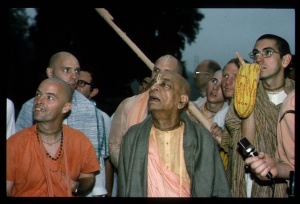SB 1.10.24: Difference between revisions
m (1 revision(s)) |
No edit summary |
||
| Line 1: | Line 1: | ||
{{info | {{info | ||
|speaker= | |speaker=Ladies of Hastināpura | ||
|listener=to each other | |listener=to each other | ||
}} | }} | ||
[[Category:Srimad-Bhagavatam - Canto 01 Chapter 10]] | |||
[[Category:Bhagavatam Verses Spoken by the Ladies of Hastinapura - Vanisource|011024]] | |||
<div style="float:left">'''[[Srimad-Bhagavatam]] - [[SB 1|First Canto]] - [[SB 1.10: Departure of Lord Krsna for Dvaraka|Chapter 10: Departure of Lord Kṛṣṇa for Dvārakā]]'''</div> | |||
<div style="float:right">[[File:Go-previous.png|link=SB 1.10.23]] '''[[SB 1.10.23]] - [[SB 1.10.25]]''' [[File:Go-next.png|link=SB 1.10.25]]</div> | |||
{{CompareVersions|SB|1.10.24|SB 1964|SB 1972-77}} | |||
{{RandomImage}} | |||
==== TEXT 24 ==== | ==== TEXT 24 ==== | ||
<div class="verse"> | |||
<div | :sa vā ayaṁ sakhy anugīta-sat-katho | ||
sa vā ayaṁ sakhy anugīta-sat-katho | :vedeṣu guhyeṣu ca guhya-vādibhiḥ | ||
vedeṣu guhyeṣu ca guhya-vādibhiḥ | :ya eka īśo jagad-ātma-līlayā | ||
ya eka īśo jagad-ātma-līlayā | :sṛjaty avaty atti na tatra sajjate | ||
sṛjaty avaty atti na tatra sajjate | |||
</div> | </div> | ||
| Line 18: | Line 23: | ||
==== SYNONYMS ==== | ==== SYNONYMS ==== | ||
<div class="synonyms"> | |||
<div | ''saḥ''—He; ''vai''—also; ''ayam''—this; ''sakhi''—O my friend; ''anugīta''—described; ''sat-kathaḥ''—the excellent pastimes; ''vedeṣu''—in the Vedic literatures; ''guhyeṣu''—confidentially; ''ca''—as also; ''guhya-vādibhiḥ''—by the confidential devotees; ''yaḥ''—one who; ''ekaḥ''—one only; ''īśaḥ''—the supreme controller; ''jagat''—of the complete creation; ''ātma''—Supersoul; ''līlayā''—by manifestation of pastimes; ''sṛjati''—creates; ''avati atti''—also maintains and annihilates; ''na''—never; ''tatra''—there; ''sajjate''—becomes attached to it. | ||
</div> | </div> | ||
| Line 26: | Line 30: | ||
==== TRANSLATION ==== | ==== TRANSLATION ==== | ||
<div class="translation"> | |||
<div | |||
O dear friends, here is that very Personality of Godhead whose attractive and confidential pastimes are described in the confidential parts of Vedic literature by His great devotees. It is He only who creates, maintains and annihilates the material world and yet remains unaffected. | O dear friends, here is that very Personality of Godhead whose attractive and confidential pastimes are described in the confidential parts of Vedic literature by His great devotees. It is He only who creates, maintains and annihilates the material world and yet remains unaffected. | ||
</div> | </div> | ||
| Line 34: | Line 37: | ||
==== PURPORT ==== | ==== PURPORT ==== | ||
<div class="purport"> | |||
As it is stated in the [[Bhagavad-gita As It Is (1972)|''Bhagavad-gītā'']], all the Vedic literatures are glorifying the greatness of Lord Śrī Kṛṣṇa. Here it is confirmed in the [[Srimad-Bhagavatam|''Bhāgavatam'']] also. The Vedas are expanded by many branches and subbranches by great devotees and empowered incarnations of the Lord like Vyāsa, Nārada, Śukadeva Gosvāmī, the Kumāras, Kapila, Prahlāda, Janaka, Bali and Yamarāja, but in the [[Srimad-Bhagavatam|''Śrīmad-Bhāgavatam'']] especially, the confidential parts of His activities are described by the confidential devotee Śukadeva Gosvāmī. In the ''Vedānta-sūtras'' or ''Upaniṣads'' there is only a hint of the confidential parts of His pastimes. In such Vedic literatures as the ''Upaniṣads'', the Lord has expressively been distinguished from the mundane conception of His existence. His identity being fully spiritual, His form, name, quality, and paraphernalia, etc., have been elaborately distinguished from matter, and therefore He is sometimes misunderstood by less intelligent persons as impersonal. But factually He is the Supreme Person, Bhagavān, and He is partially represented as Paramātmā or impersonal Brahman. | |||
</div> | |||
<div | |||
<div style="float:right; clear:both;">[[File:Go-previous.png|link=SB 1.10.23]] '''[[SB 1.10.23]] - [[SB 1.10.25]]''' [[File:Go-next.png|link=SB 1.10.25]]</div> | |||
</div> | __NOTOC__ | ||
__NOTOC__ | __NOEDITSECTION__ | ||
Revision as of 10:28, 1 May 2021

A.C. Bhaktivedanta Swami Prabhupada
TEXT 24
- sa vā ayaṁ sakhy anugīta-sat-katho
- vedeṣu guhyeṣu ca guhya-vādibhiḥ
- ya eka īśo jagad-ātma-līlayā
- sṛjaty avaty atti na tatra sajjate
SYNONYMS
saḥ—He; vai—also; ayam—this; sakhi—O my friend; anugīta—described; sat-kathaḥ—the excellent pastimes; vedeṣu—in the Vedic literatures; guhyeṣu—confidentially; ca—as also; guhya-vādibhiḥ—by the confidential devotees; yaḥ—one who; ekaḥ—one only; īśaḥ—the supreme controller; jagat—of the complete creation; ātma—Supersoul; līlayā—by manifestation of pastimes; sṛjati—creates; avati atti—also maintains and annihilates; na—never; tatra—there; sajjate—becomes attached to it.
TRANSLATION
O dear friends, here is that very Personality of Godhead whose attractive and confidential pastimes are described in the confidential parts of Vedic literature by His great devotees. It is He only who creates, maintains and annihilates the material world and yet remains unaffected.
PURPORT
As it is stated in the Bhagavad-gītā, all the Vedic literatures are glorifying the greatness of Lord Śrī Kṛṣṇa. Here it is confirmed in the Bhāgavatam also. The Vedas are expanded by many branches and subbranches by great devotees and empowered incarnations of the Lord like Vyāsa, Nārada, Śukadeva Gosvāmī, the Kumāras, Kapila, Prahlāda, Janaka, Bali and Yamarāja, but in the Śrīmad-Bhāgavatam especially, the confidential parts of His activities are described by the confidential devotee Śukadeva Gosvāmī. In the Vedānta-sūtras or Upaniṣads there is only a hint of the confidential parts of His pastimes. In such Vedic literatures as the Upaniṣads, the Lord has expressively been distinguished from the mundane conception of His existence. His identity being fully spiritual, His form, name, quality, and paraphernalia, etc., have been elaborately distinguished from matter, and therefore He is sometimes misunderstood by less intelligent persons as impersonal. But factually He is the Supreme Person, Bhagavān, and He is partially represented as Paramātmā or impersonal Brahman.